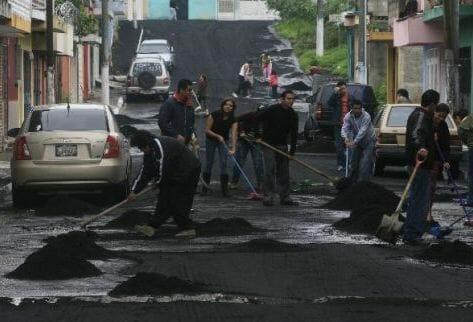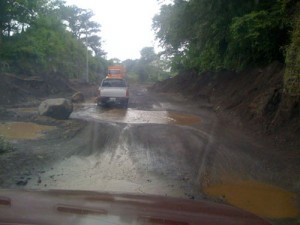
Men and woman attempt to clean up the volcanic sand and ash that has littered the streets.
Editor: This article is courtesy of Frank, a consultant from Phoenix who was doing mission work in Guatemala last week when a volcano erupted. Two days later tropical storm Agatha hit, devastating the country.
Guatemala is a beautiful country that has long struggled with poverty, famine, civil war and injustice. That’s what motivated me to visit for two weeks on a church-sponsored mission to feed the hungry and teach people about the benefits of personal hygiene.
Little did I know what awaited me during my visit. On the 28th of May, a volcano that has long been active (but rarely dangerous) spewed thousands of tons of rock and ash more than 4,000 feet into the sky. Although the little town I was in was upwind and therefore not affected, the capital city was showered with up to three inches of black sand. We all know what three inches of snow looks like, but imagine three inches of dense, heavy, gritty sand covering everything!
The country came to a standstill as the four million people in the capital struggled to deal with sand that closed schools, brought transportation to a standstill and collapsed roofs. The airport was closed as well, and nobody could get in or out of the capital.
The resulting traffic chaos routed thousands of trucks, cars and buses through the little town that I was visiting, turning the dirt and gravel streets into muddy, rutted paths that were barely passable. Tens of thousands of people were now passing through this town that normally had just a few thousand residents, and as they passed through (slowly, given the road conditions) they consumed bottled water, food and toilet paper, none of which could be easily replaced since the capital (where locals all buy supplies in big box stores similar to Wal-Mart and Sam’s Club) was closed to traffic.
It occurred to me that, while much of the U.S. is not under threat of volcanic ash, suburban life anywhere in the U.S. would be similarly affected by disaster in a big city. After all, in the aftermath of Katrina, you didn’t have to live in downtown New Orleans to have your life turned upside down, even if your small town in Louisiana didn’t have serious damage.
As the country struggled to deal with the sand and the impact on traffic and commerce, our worst fears were realized; the low pressure front off the Pacific coast turned into tropical storm “Agatha” and it began raining…hard. The sand in the streets turned into sludge, and the sand in the gutters began clumping up, forming natural sand dams, causing gutters and sewers to instantly overflow, sending rainwater, trash, mud and sewage into the streets.

The 'highway' between Rodeo and Escuintla.
In this country of 14 million, 70% of the people live in cities of less than 250,000 people. None of these have first-world infrastructure, and so within a few hours of the rains starting, there was chaos. Roads instantly became rivers, and life came to a standstill. As the rain continued and even worsened (it would eventually rain up to 3 feet), a minor inconvenience turned into a major catastrophe.
The countryside is crisscrossed by rivers (one of the country’s few abundant natural resources is water), and hundreds of bridges were destroyed as water levels rose with lightning speed and cars, trees and debris accumulated, acting like a weapon of unimaginable force.
My host family of permanent missionaries lives in a nice, safe neighborhood populated by lots of retired folks from Canada, the U.S. and the UK who live in Guatemala for the low cost of living and year round perfect temperatures. We were spared any real damage, but as the day wore on, even these nice homes started to show signs of wear under the power of the wind and rain. The pressure outside was so great that water was being forced through window frames and under caulking, pouring into our home.
Then the power went off.
For hours our mission group was on all fours, using every available towel, dirty laundry and anything still dry to attempt to slow the rate of the water (that didn’t appear to be flooding so much as “leaking”) that had covered the floor in two rooms within a few hours.
By nightfall we were cold, wet and exhausted. Everything in the house was wet (or at least damp) and without electricity, we couldn’t dry anything and couldn’t see much. Sure, the host family missionaries were well stocked with flashlights, candles and matches, but you wouldn’t believe how little light those candles put out when you’re accustomed to electric lights on demand.
Fortunately, the stove was gas powered, so we were able to enjoy a filling, warm meal while the storm raged outside. News reports said the rain might continue for another 24 hours, and we began to wonder aloud about the chaos outside, and all those people who weren’t prepared for this kind of crisis.
Little did we know how our own situation was about to change.
(Part 2 next week)
 Off The Grid News Better Ideas For Off The Grid Living
Off The Grid News Better Ideas For Off The Grid Living



